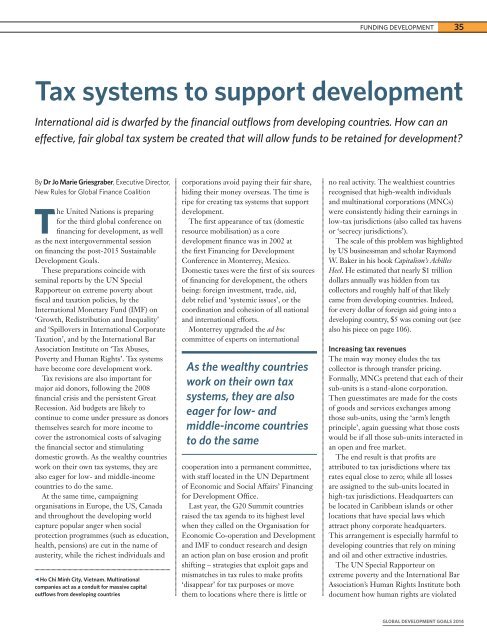FAMBB
FAMBB
FAMBB
Create successful ePaper yourself
Turn your PDF publications into a flip-book with our unique Google optimized e-Paper software.
FUNDING DEVELOPMENT35Tax systems to support developmentInternational aid is dwarfed by the financial outflows from developing countries. How can aneffective, fair global tax system be created that will allow funds to be retained for development?By Dr Jo Marie Griesgraber, Executive Director,New Rules for Global Finance CoalitionThe United Nations is preparingfor the third global conference onfinancing for development, as wellas the next intergovernmental sessionon financing the post-2015 SustainableDevelopment Goals.These preparations coincide withseminal reports by the UN SpecialRapporteur on extreme poverty aboutfiscal and taxation policies, by theInternational Monetary Fund (IMF) on‘Growth, Redistribution and Inequality’and ‘Spillovers in International CorporateTaxation’, and by the International BarAssociation Institute on ‘Tax Abuses,Poverty and Human Rights’. Tax systemshave become core development work.Tax revisions are also important formajor aid donors, following the 2008financial crisis and the persistent GreatRecession. Aid budgets are likely tocontinue to come under pressure as donorsthemselves search for more income tocover the astronomical costs of salvagingthe financial sector and stimulatingdomestic growth. As the wealthy countrieswork on their own tax systems, they arealso eager for low- and middle-incomecountries to do the same.At the same time, campaigningorganisations in Europe, the US, Canadaand throughout the developing worldcapture popular anger when socialprotection programmes (such as education,health, pensions) are cut in the name ofausterity, while the richest individuals andHo Chi Minh City, Vietnam. Multinationalcompanies act as a conduit for massive capitaloutflows from developing countriescorporations avoid paying their fair share,hiding their money overseas. The time isripe for creating tax systems that supportdevelopment.The first appearance of tax (domesticresource mobilisation) as a coredevelopment finance was in 2002 atthe first Financing for DevelopmentConference in Monterrey, Mexico.Domestic taxes were the first of six sourcesof financing for development, the othersbeing: foreign investment, trade, aid,debt relief and ‘systemic issues’, or thecoordination and cohesion of all nationaland international efforts.Monterrey upgraded the ad hoccommittee of experts on internationalAs the wealthy countrieswork on their own taxsystems, they are alsoeager for low- andmiddle-income countriesto do the samecooperation into a permanent committee,with staff located in the UN Departmentof Economic and Social Affairs’ Financingfor Development Office.Last year, the G20 Summit countriesraised the tax agenda to its highest levelwhen they called on the Organisation forEconomic Co-operation and Developmentand IMF to conduct research and designan action plan on base erosion and profitshifting – strategies that exploit gaps andmismatches in tax rules to make profits‘disappear’ for tax purposes or movethem to locations where there is little orno real activity. The wealthiest countriesrecognised that high-wealth individualsand multinational corporations (MNCs)were consistently hiding their earnings inlow-tax jurisdictions (also called tax havensor ‘secrecy jurisdictions’).The scale of this problem was highlightedby US businessman and scholar RaymondW. Baker in his book Capitalism’s AchillesHeel. He estimated that nearly $1 trilliondollars annually was hidden from taxcollectors and roughly half of that likelycame from developing countries. Indeed,for every dollar of foreign aid going into adeveloping country, $5 was coming out (seealso his piece on page 106).Increasing tax revenuesThe main way money eludes the taxcollector is through transfer pricing.Formally, MNCs pretend that each of theirsub-units is a stand-alone corporation.Then guesstimates are made for the costsof goods and services exchanges amongthose sub-units, using the ‘arm’s lengthprinciple’, again guessing what those costswould be if all those sub-units interacted inan open and free market.The end result is that profits areattributed to tax jurisdictions where taxrates equal close to zero; while all lossesare assigned to the sub-units located inhigh-tax jurisdictions. Headquarters canbe located in Caribbean islands or otherlocations that have special laws whichattract phony corporate headquarters.This arrangement is especially harmful todeveloping countries that rely on miningand oil and other extractive industries.The UN Special Rapporteur onextreme poverty and the International BarAssociation’s Human Rights Institute bothdocument how human rights are violatedGLOBAL DEVELOPMENT GOALS 2014


